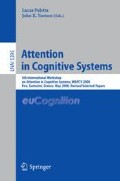Abstract
The first question answered in this paper is whether or not learning attention control in the decision space is feasible and how to develop an online as well as interactive learning approach for such control in this space, in case of feasibility. Here, decision space is formed by the decision vector of the agents each has allowed to dynamically observe just a subset of all available sensors. Attention control in this new space means active and dynamic selection of these decision agents to contribute in making final decision. The second debate is verifying the advantages of attention control in decision space over that in perceptual space. According to the tight coupling of attention control and motor action selection, in order to answer above mentioned questions, attention control and motor action selection are formulated in a unified optimization problem and reinforcement learning is utilized to solve it. In addition to the theoretic comparison of learning attention control in perceptual and decision space in terms of computational complexity, two proposed approaches are tested on a simple traffic sign recognition task.
Access this chapter
Tax calculation will be finalised at checkout
Purchases are for personal use only
Preview
Unable to display preview. Download preview PDF.
References
James, W.: The principles of psychology. Holt, New York (1890)
Reichle, E., Laurent, A.: Using Reinforcement Learning to Understand the Emergence of “Intelligent” Eye-Movement Behavior During Reading. Psychological Review Copyright 2006 by the American Psychological Association 113(2), 390–408 (2006)
Shariatpanahi, H.F., Ahmadabadi, M.N.: Biologically Inspired Framework for Learning and Abstract Representation of Attention Control. In: Proceedings of International Workshop on Attention in Cognitive Systems, at IJCAI 2007, Hyderabad, India, pp. 63–80 (2007)
Fritz, G., Seifert, C., Paletta, L., Bischof, H.: Attentive object detection using an information theoretic saliency measure. In: Paletta, L., Tsotsos, J.K., Rome, E., Humphreys, G.W. (eds.) WAPCV 2004. LNCS, vol. 3368, pp. 29–41. Springer, Heidelberg (2005)
Paletta, L., Fritz, G., Seifert, C.: Cascaded Sequential Attention for Object Recognition with Informative Local Descriptors and Q-learning of Grouping Strategies. In: Proceedings of the IEEE Computer Society Conference on Computer Vision and Pattern Recognition (2005)
Gonc, L., Giraldi, G., Oliveira, A., Grupen, R.: Learning Policies for Attentional Control. In: IEEE International Symposium on Computational Intelligence in Robotics and Automation, pp. 294–299 (1999)
Darrell, T.: Reinforcement Learning of Active Recognition Behaviors. In: Portions of this paper previously appeared in Advances in Neural Information Processing Systems (NIPS 1995), vol. 8. MIT Press, Cambridge (1995); Vidyasagar M. (ed.) Intelligent Robotic Systems, pp. 73-80. Tata Press (1998)
Maunsell, J., Treue, S.: Feature-based attention in visual cortex. TRENDS in Neurosciences, TINS special issue: The Neural Substrates of Cognition 29(6) (2006)
Rizzolatti, G., Fogassi, L., Gallese, V.: Neurophysiological mechanisms underlying the understanding and imitation of action. Review Neuroscience (2001)
Rizzolatti, G., Riggio, L., Dascola, I., Umilta, C.: Reorienting Attention across the Horizontal and Vertical Meridians: Evidence in Favor of a pre-motor theory of attention. NeuroPhysiologia 25(1A), 31–40 (1987)
Putterman, M.L.: Markov Decision Processes. John Wiely and Sons, New York (1994)
Kuncheva, L., Bezdek, J., Duin, R.: Decision templates for multiple classifier fusion. The Journal of the Pattern Recognition Society 34(2), 299–314 (2001)
Zhu, Y.: Multi-sensor Decision and Estimation Fusion. The International Series on Asian Studies in Computer and Information Science 14 (2002) ISBN: 978-1-4020-7258-1
Schapire, R.: The Boosting Approach to Machine Learning: An Overview, AT&T Labs, Research Shannon Laboratory, Nonlinear Estimation and Classification. Springer, Heidelberg (2003)
Sutton, R.S., Barto, A.G.: Reinforcement Learning. MIT Press, Cambridge (1998)
Author information
Authors and Affiliations
Editor information
Editors and Affiliations
Rights and permissions
Copyright information
© 2009 Springer-Verlag Berlin Heidelberg
About this paper
Cite this paper
Mirian, M.S., Nili Ahmadabadi, M., Araabi, B.N., Siegwart, R.R. (2009). Comparing Learning Attention Control in Perceptual and Decision Space. In: Paletta, L., Tsotsos, J.K. (eds) Attention in Cognitive Systems. WAPCV 2008. Lecture Notes in Computer Science(), vol 5395. Springer, Berlin, Heidelberg. https://doi.org/10.1007/978-3-642-00582-4_18
Download citation
DOI: https://doi.org/10.1007/978-3-642-00582-4_18
Publisher Name: Springer, Berlin, Heidelberg
Print ISBN: 978-3-642-00581-7
Online ISBN: 978-3-642-00582-4
eBook Packages: Computer ScienceComputer Science (R0)

